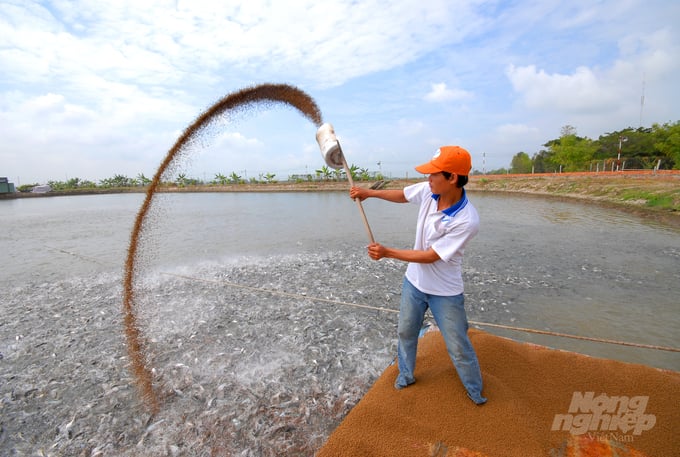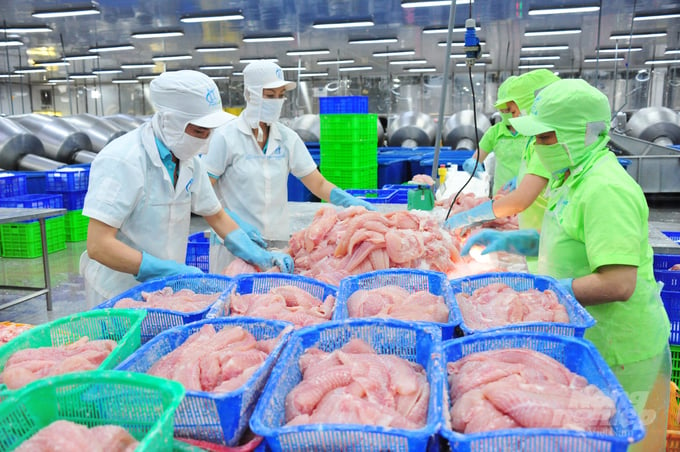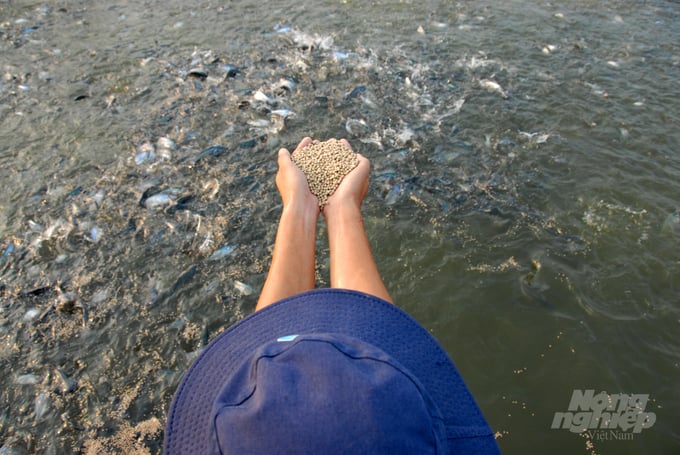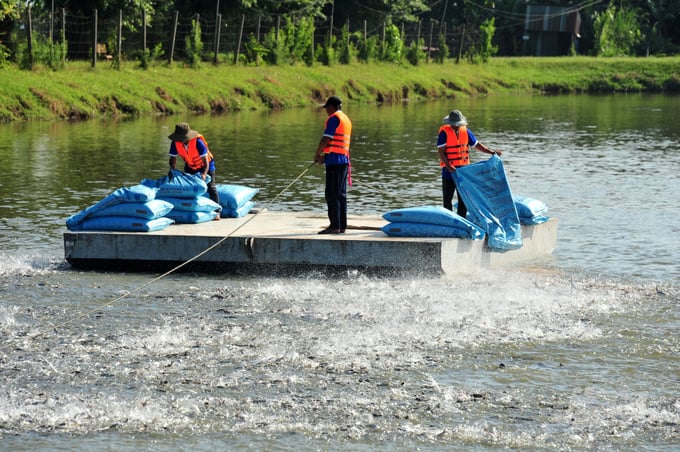November 27, 2025 | 20:50 GMT +7
November 27, 2025 | 20:50 GMT +7
Hotline: 0913.378.918
November 27, 2025 | 20:50 GMT +7
Hotline: 0913.378.918

Dong Thap strives to have 100% of pangasius farming establishments granted farming area codes and 100% of commercial pangasius farming establishments granted certificates of eligibility by 2025. Photo: Le Hoang Vu.
In recent years, Vietnam's pangasius industry faces many difficulties in production and export due to the impact of many adverse factors such as climate change, fish diseases, high production costs, technical barriers and strict regulations from export markets. The application of high technology in the production and standardization of farming areas has increased added value for pangasius, gradually bringing out the strength of this item to develop more sustainably.

The application of high technology in production has increased added value for pangasius. Photo: Le Hoang Vu.
Dong Thap has the largest pangasius farming area in the Mekong Delta with over 2,000 ha per year. Most of the pangasius farming areas receive the support and attention of the functional sector, especially Dong Thap People's Committee, which always creates conditions for granting pangasius farming area codes to businesses, cooperatives and farming households, currently reaching 96% of the total farming area.
Dong Thap has granted farming area codes to more than 1,600 ha / 1770 ponds of 18 enterprises and 180 individual households. The province has 378 farming establishments in total. In particular, the farming area of enterprises is more than 661 ha/78 areas, and households are nearly 967 ha/300 areas.
The remaining 4%, nearly 100 hectares of pangasius farming, have not been granted a farming area code because the pangasius farming area is facing certain circumstances. It may be that the farming areas are located in the planning area or the farmer has not yet converted rice land to mariculture land.

Up to now, businesses in Dong Thap have expanded the pangasius export market to 134 countries around the world. Photo: Le Hoang Vu.
In order to export pangasius smoothly, Dong Thap strives to have 100% of pangasius farming establishments granted farming area codes according to regulations by 2025. 100% of commercial pangasius farming establishments will be granted certificates of eligibility or sign a commitment to producing safe food according to regulations in service of export. Over 50% of the commercial pangasius farming area will be certified with good agricultural practice (GAP standards) and 90% of the individual pangasius farming households participate in production - consumption linkages.
As for improving the quality of pangasius seeds, the province strives to have more than 75% of the fingerlings serving commercial farming being high quality, ensuring that 60% of pangasius breeding establishments use genetically improved fish stocks. The pangasius farming environment in Dong Thap will continue to be closely monitored, aiming to have 60% of the farming area of the wastewater treatment system, sludge according to regulations and 100% of the water supply on the main river regularly monitored.
According to Dong Thap Department of Agriculture and Rural Development, the production of pangasius in this province accounts for over 33% of the area and nearly 35% of pangasius production in the whole Mekong Delta. Dong Thap’s pangasius industry provides 60% of the fingerlings output for the region.
The province currently has 76 breeding facilities and more than 1,100 pangasius hatcheries (estimated area of 950 ha). Annually, it supplies about 20 billion pangasius larvae and nearly 1.3 billion pangasius fingerlings, enough to meet the demand for commercial farming in the province as well as some other neighboring provinces.

Dong Thap encourages seed production facilities, small commercial farming establishments to create linkage and form assembly halls, cooperative groups, and cooperatives in order to create products in large quantities but still uniform in quality. Photo: Le Hoang Vu.
Regarding the solutions to overcome difficulties in breeding pangasius in Dong Thap, Deputy Director of Dong Thap Department of Agriculture and Rural Development Huynh Tat Dat said, “Dong Thap is currently restructuring the pangasius industry. The goal is to do well in the environmental monitoring work for aquaculture water, promote digital transformation in the management and administration of the pangasius industry, particularly in terms of planning management, identification code issuance, production information, market, farming environment adaptive to climate change and sustainable development”.

Dong Thap People's Committee has submitted a written proposal to the Ministry of Agriculture and Rural Development on ensuring a source of good quality seed, gradually replacing the local broodstock. Photo: Le Hoang Vu.
Up to the present, businesses in Dong Thap province have expanded the export market of pangasius to 134 countries, so pangasius export market is now very diverse, spreading wide from low-demand markets like Europe Asia - Middle East, China to more advanced markets such as Europe, America. The domestic market has also received keen interest from consumers and is further promoted by the authorities.
Translated by Samuel Pham - Huyen Vu

(VAN) According to Mr. Vo Minh Thanh, Director of the Tay Ninh Department of Agriculture and Environment, Resolution 57 has created a new development pathway for the locality, shifting from traditional toward modern agriculture.
/2025/11/26/4909-2-154329_878.jpg)
(VAN) Pearl grouper farming in HDPE cages not only delivers economic efficiency but also contributes to protecting the environment, creating jobs, and promoting marine-based experiential tourism.

(VAN) The model of making a living under the forest canopy through the agroforestry system in Van Son commune, Bac Ninh province, is expected to generate an annual income of approximately VND 30 million/ha.

(VAN) Many enterprises in Can Tho are harnessing natural energy and reducing greenhouse gas emissions in their production processes, thereby contributing to the promotion of a sustainable green transition.
/2025/11/24/3536-2-112800_176.jpg)
(VAN) Dong Nai now has tens of thousands of hectares of forests certified for sustainable management, and this area will continue to be expanded in the coming period.

(VAN) Vinh Ha hamlet (Dai Xuyen commune, Hanoi) is shifting away from small-scale farming as households adopt bioscurity into their breeder chicken models.

(VAN) Heavy rains make aquatic species more vulnerable to disease. Proactive water management and high-tech systems help farmers prevent outbreaks and protect yields.